Electrical symbols or electronic circuits are virtually represented by circuit diagrams. There are some standard symbols to represent the components in a circuits. This article gives some of the frequently used different electrical and electronic circuit symbols for drawing the circuits. There are many electrical and electronic schematic symbols are used to signify basic electronic or electrical device. These are mostly we used for draw circuit diagrams.
All Electrical Circuit & Electronic Components Symbols
Below are different kind of electronic components symbols we mentioned category wise. Hope this information will helps to understand clearly.
- Wires
- Switches
- Sources
- Ground
- Resistor
- Variable Resistor
- Capacitor
- Inductors
- Diodes
- Transistor
- Logic Gates
- Amplifiers
- Antenna
- Transformer
- Miscellaneous
Electrical Symbols & Electronic Symbols
Wires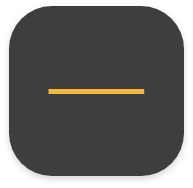
Represents a conductor that conducts electrical current. Also called a power line or electric line or wire. | Connected Wires
Represents the connection of two conductors. Dot shows the junction point. | Unconnected Wires
Represents two unconnected wires/conductors. |
Input Bus Line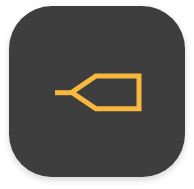
Represents a bus for input or incoming data. | Output Bus Line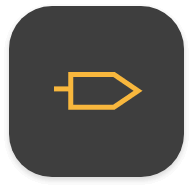
Represents a bus for output or outgoing data. | Terminal
Represents start or end point. |
Bus Line
Represents a number of conductors joined together to form a bus wire. | ||
Push Button (Normally Open)
This switch is in ON state when the button is pressed otherwise it is in OFF state. | Push Button (Normally Closed)
This switch is initially in ON state. This goes to OFF state when it is released. | SPST Switch
Single pole single throw is abbreviated as SPST. This acts as ON/OFF switch. Poles define the number of circuits it can be connected to and throws defines the number of positions that a pole connects. |
SPDT Switch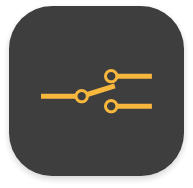
Single pole double throw is abbreviated as SPDT. This switch allows the current to flow in any one of the two directions by adjusting its position. | DPST Switch
Double pole single throw is abbreviated as DPST. This switch can drive two circuits at a time. | DPDT Switch
Double pole double throw is the full form of DPDT. This can connect the four circuits by changing the position. |
Relay Switch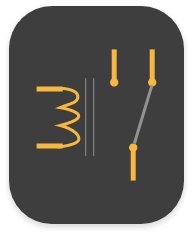
This represents the relay switch. This can control the AC Loads using the DC voltage applied to the coil. | ||
AC Supply
This represents AC supply in the circuit. | DC Supply
This represents the DC power supply. It applies DC supply to the circuit. | Constant Current Source
The symbol represents an independent current source which delivers constant current. |
Controlled current Source
It is a dependent current source. Usually depends on other sources (voltage or current). | Controlled Voltage Source
It is a dependent voltage source. Usually depends on other sources (voltage or current). | Single Cell Battery
This provides supply to the circuit. |
Multi Cell Battery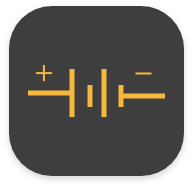
Combination of multiple single cell batteries or a single large cell battery. The voltage is usually higher. | ||
| Wave Generators | ||
Sinusoidal Generator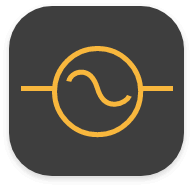
Represents sine wave generator. | Pulse Generator
Represents pulse or square wave generator. | Triangular Wave 
Represents triangular wave generator. |
| GROUND SYMBOLS | ||
Ground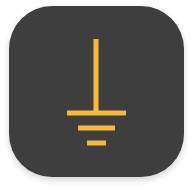
It is equivalent to theoretical 0V and is used as zero potential reference. It is the potential of perfectly conducting earth. | Signal Ground
It is a reference point from which the signal is measured. There may be several signal grounds in a circuit due to the voltage drops in a circuit. | Chassis Ground
It acts as a barrier between user and the circuit and prevents electric shock. |
| RESISTOR SYMBOLS | ||
Fixed Resistor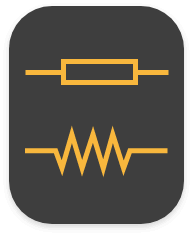
It is a device that opposes the flow of current in a circuit. These two symbols are used to represent fixed resistor. | ||
| VARIABLE RESISTOR | ||
Rheostat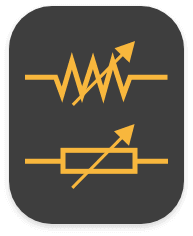
It is a two terminal variable resistor. They are generally used to control the current in the circuit. Generally used in tuning circuits and power control applications like heaters, ovens etc | Preset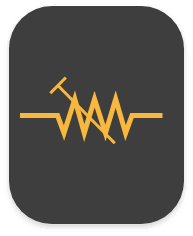
It is a mini variable resistor. It is also called Trimmer Resistor or Trim Pot. The resistance is adjusted with rotary control present on top of it with the help of a screw driver. They are used to adjust the sensitivity of the circuit like temperature or light. | Thermistor
It is a temperature sensitive resistor. They are used in temperature sensing, current limiting circuits, over-current protection circuits etc. |
Varistor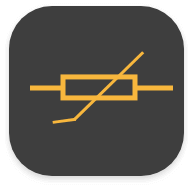
It is a Voltage Dependent Resistor. It has non-linear current-voltage characteristics. Generally used in circuit protection from voltage surges and excessive transient voltages. | Magneto Resistor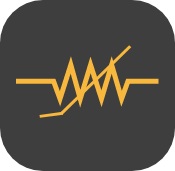
They are also called as Magnetic Dependent Resistors (MDR). The resistance of magneto resistor varies according to the external magnetic field strength. They are used in electronic compass, ferrous material detection, position sensors etc. | LDR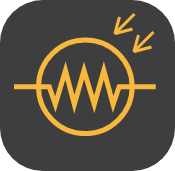
They are also called as Photo Resistors. The resistance of LDR varies with the intensity of the light incident on it. They are generally used in light sensing applications. |
Tapped resistor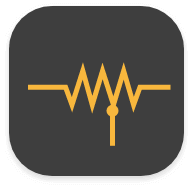
A wire-wound type fixed resistor with one or more terminals along its length. Generally used in voltage divider applications. | Attenuator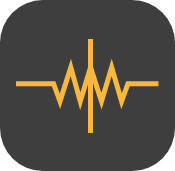
It is a device used to lower the power of a signal. They are made from simple voltage dividers and hence can be classified in the family of the resistors. | Memristor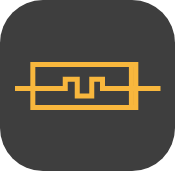
The resistance of memristor is varied according to the direction of flow of charge. Memristors can be used in signal processing, logic/computation, non-volatile memory etc. |
| CAPACITOR SYMBOLS | ||
Non Polarized Capacitor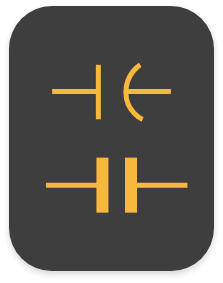
Capacitor stores the charge in the form of electrical energy. These two symbols are used for non-polarized capacitor. Non-polarized capacitors are big in size with small capacitance. They can be used in both AC and DC circuits. | Polarized Capacitor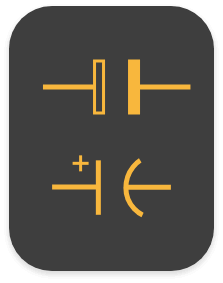
Polarized capacitors are small in size but have high capacitance. They are used in DC circuits. They can be used as filters, for bypassing or passing low frequency signals. | Electrolytic Capacitor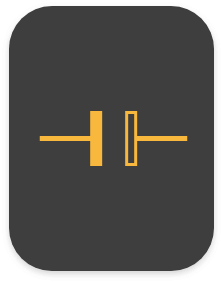
Almost all electrolytic capacitors are polarized and hence used in DC circuits |
Feed through Capacitor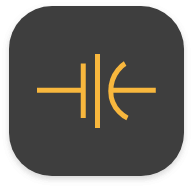
They provide low impedance path to ground for high frequency signals | Variable Capacitor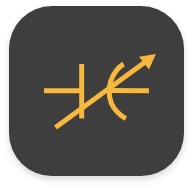
The capacitance of the variable capacitor can be adjusted by turning the knob. They are widely used to adjust the frequency , that is for tuning. | |
| INDUCTORS | ||
Iron Core Inductor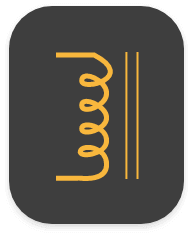
These are used as substitutes to ferrite core inductors. Ferrite core or Ferromagnetic inductors have high permeability and require air gap to reduce it. Iron powdered core inductors have this air gap integrated. | Ferrite Core Inductors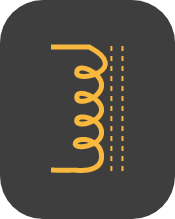
Core material, in this type of inductors is made of ferrite material. These are mostly used to suppress the interference of electromagnetic waves. | Center Tapped Inductors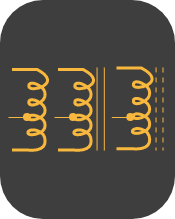
These are used in coupling of signals, |
Variable Inductors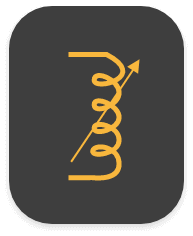
Movable ferrite magnetic core variable inductors are most common. The inductance is varied by sliding the core in or out of the coil. | ||
| DIODES | ||
Pn Junction Diode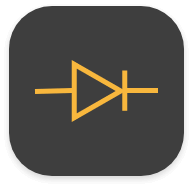
A PN junction diode allows the current to flow only in forward bias condition. These diodes can be used in clipping and clamping circuits , as rectifiers in dc circuits etc. | Zener Diode
In forward bias condition, it acts as normal diode and allows current. It also allows current to flow in reverse bias condition when the voltage reaches a certain break-down point. Generally used in voltage regulator and over voltage protection circuits. | Photodiode
Photodiode detects the light energy and converts it into current or voltage by a mechanism called photoelectric effect. These are used in CD players , Cameras etc. |
Led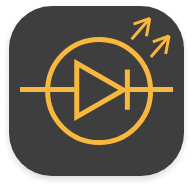
Light emitting diode is similar to PN junction diode but they emit energy in the form of light instead of heat. These are mostly used in indication , lightening applications. | Varactor Diode
Varactor diode is called varicap or variable capacitance diode. The capacitance of this diode varies according to the applied input voltage. This is used in frequency controlled oscillators , frequency multipliers etc. | Shockley Diode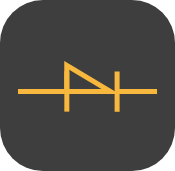
This is a four layer diode. This had fast switching operation and hence is used in switching applications. |
Schottky Diode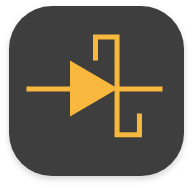
It represents Schottky diode. It has low forward voltage drop and it can switch rapidly. Used in voltage clamping, rectifiers, reverse current and discharge protection | Tunnel Diode
This is also known as Esaki diode.It can switch very fastly and can perform well in micro wave frequency range. This is used in oscillator circuits and micro wave circuits. | Thyristor
It consists of four layers of alternating P and N materials. They act as bistable switches and are used in circuits where high voltages and currents are involved. |
Constant Current Diode
Also called as Current Limiting Diode or Current Regulating Diode. It limits the current to a specified maximum value. | Laser Diode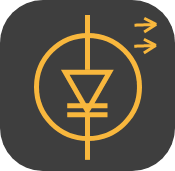
The laser diode is similar to light emitting diode. The active region is formed in intrinsic region in PIN structure. Laser diodes find its applications in laser printing, laser scanning etc. | |
| TRANSISTOR SYMBOLS | ||
NPN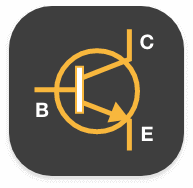
It is made of combination of P-type semiconductor between two N-type semiconductors. It is switched ON when the base-emitter junction is forward biased. They are commonly used for amplifying and switching applications. | PNP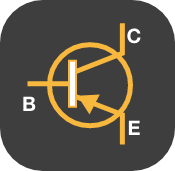
It is made of combination of N-type semiconductor between two P-type semiconductors. It is switched ON when the base-emitter junction is reverse biased. These are used for amplifying and switching applications. | |
| JFET | ||
N- Channel JFET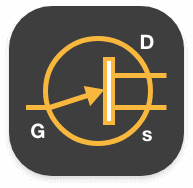
N-channel JFET is made by n-type silicon bars which form two PN junctions at the side. Majority charge carriers here are electrons. | P-Channel JFET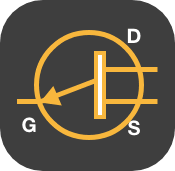
P-Channel JFET is made by p-type silicon bar which forms two PN junctions at the side. Majority charge carriers here are holes. | |
| MOSFET | ||
Enhancement MOSFET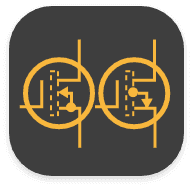
The enhancement mode MOSFET has positive gate operation. It induces negative charges into the n-channel and thus number of negative charges increases, enhancing the channel conductivity. | Depletion MOSFET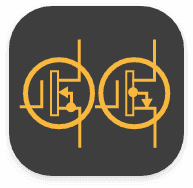
The depletion mode has negative gate operation. This decreases the width of the depletion layer. | |
Phototransistor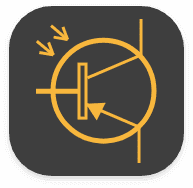
The photo transistor converts the light energy falling on it to its corresponding electrical energy. This can be used in light sensing applications.Base is left disconnected as light is used to enable the flow of current. | Photo Darlington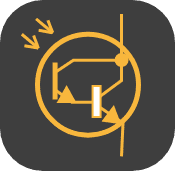
Photo Darlington Transistor is similar to phototransistor with very high gain and sensitivity | Darlington Transistor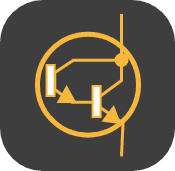
This configuration produces high current gain. They are used in power regulators, output stages of audio amplifiers, display drivers etc. |
| LOGIC GATES | ||
And Gate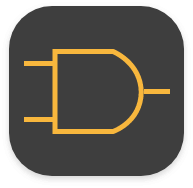
This is the basic gate and it implements logical conjunction. The output of the AND gate is high, only if both the inputs are high otherwise both are low. | Or Gate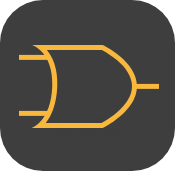
The OR gate implements logical disjunction.The output is high if any one of the inputs is high. | Nand Gate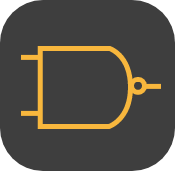
It is complement of AND gate. The output is low only when both the inputs are high, otherwise it is high. |
Nor Gate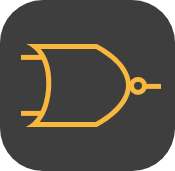
NOR gate is a not OR gate. Output of this gate is high, if both the inputs are Low, otherwise it is High. | Not Gate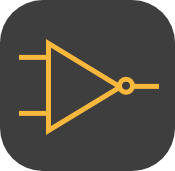
Inverter or NOT gate implements logical negation. This gate inverts the input. | Exor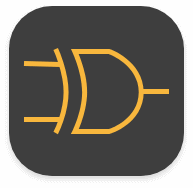
This gate implements exclusive OR logic. The output of this gate is high ,if both the inputs are different. |
Exnor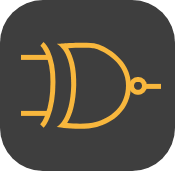
This gate implements negation of EXOR logic. The output of this gate is high , only if the two inputs are identical. | Buffer
It is an audio signaling device. Generally used in alarms, timers and for confirmation messages. | Tri-State Buffer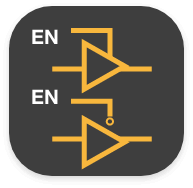
Similar to a normal buffer but with a control signal. In case of active high buffer, it operates normally only when control signal is 1. In case of active low buffer, it operates normally only when control signal is 0. |
Flip Flop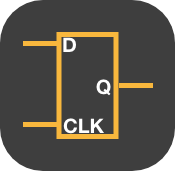
Flip flop is the also a memory element but this is a synchronous device. The figure below shows the basic D-flip-flop. | ||
| AMPLIFIERS | ||
Basic Amplifier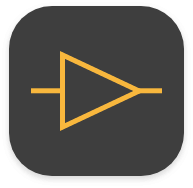
An amplifier is a device that amplifies a relatively small input signal i.e. it increases the power of the signal. They are used in communication systems, audio devices etc | Operational Amplifier
Operational Amplifier (Op Amp) is a voltage amplifier with very high gain. The input is differential. They are used in instrumentation devices, signal processing, control systems etc | |
| ANTENNA | ||
Antenna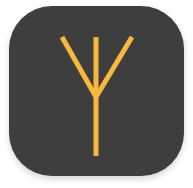
This symbol belongs to Aerial or Antenna. It converts electrical power into radio waves. It is used in wireless communication to transmit or receive the signals. | Loop Antenna
Loop antenna is named after its loop like shape of wire or other electrical conductor. They are used as receiving antennas in low frequency range. | Dipole Antenna
It is most widely used antenna.Generally used in set-top TV, shortwave transmission and FM receivers. |
| TRANSFORMER | ||
Transformer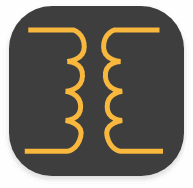
Transformer is the basic element that transfers energy in one circuit to the other circuit through electromagnetic induction. They are generally used in electric power applications to increase or decrease the voltage of AC current. | Iron Core
Uses a piece of magnetic material as core. Generally Ferro magnetic metals like iron are used. The core has high permeability and is used to confine the magnetic field. | Center Tapped
The center tapped transformer has its secondary winding divided into two parts with same number of turns in each part. This results in two individual output voltages across two line ends. Used in rectifier circuits. |
Step Up Transformer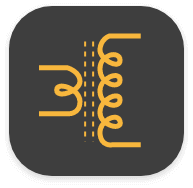
The no. of turns in secondary winding is more than that of primary winding. The output voltage is higher than input voltage. Significantly used in inverters. | Step Down Transformer
The no. of turns in secondary winding is less than that of primary winding. The output voltage is lesser than input voltage. It is widely used in low power applications. | |
| MISCELLANEOUS | ||
Buzzer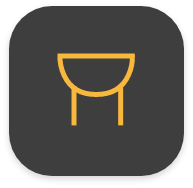
This is sound producing device. This produces buzz sound when the voltage is applied. | Loud Speaker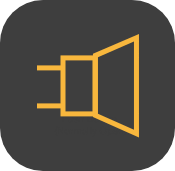
This is also an audio device. The electrical signal is converted into sound signal here. | Light Bulb
The symbol represents the light bulb. The bulb glows when required voltage is applied. |
Motor
This converts the electric energy to mechanical energy. | Fuse
Symbol represents the fuse that protects the circuit from over current. | |
Crystal Oscillator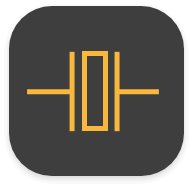
Used to generate clock signal of very precise frequency. | ADC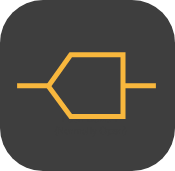
Analog to Digital converter is used convert analog signals (usually voltage) to digital values. | DAC
Digital to Analog converter is used to convert digital code to analog signals. |
Thermocouple
It is used to measure temperature. |


71 Responses
Really nice informations are here
Yes.
ok nice information
thank you for knowledge
very nice
REALLY VERY COMPREHENSIVE AND INFORMATIVE
PANESER
i like this page good
thanks
Thanks
It is informative, most of the symbols are already known. However, few of them added up my information. Few alike information may be shared.
Gud knowledge
Well information to all electrical students. …
Tks sir…….
Sooper knowledge for basic learners of electronics technician as wel as technologist !
Electronics is my passion. ❤
Good information
Thnxx for your help
Am impressed about the knowledge I acquired from you.
a little confused about the chassis ground and signal ground symbols, are they correct? because google says otherwise
They are correct. Google is wrong
Owsm.. ever.
M an engineering student. And it help mee for my electronic subject.
i like the stuff in this page. its helped a lot.
Thanks
I AM IMPRESSED. THANK YOU FOR THE KNOWLEDGE.
Well information to all electrical students. …
This is good symbols nice
What devices are inputs outputs and controlled deviceses .
Its really hard not knowing what they act as because
I only know a wire a resistor a bulb and a switch and battery ?
Lovely… How do I get direct and correct circuit diagram from here
we are doing this in a class at Lewis and Clark middle school in Jefferson city Missouri
superb well to known this symbols for our studies.
Very usefuul
Thanks you for this information
so useful indeed.
am so grateful
really beneficial
Really very usefull for studies
I have a component with a symbol that looks like this engraved in the top:
_ _ _
I I_I I_I I
And is constructed like this:
.___.
IX XI
I I
I I
I I
_______________________________________________
The symbol on top of the component is etched in red, and looks very similar to an oscilloscope readout of a square wave, and appears similar to components I’ve seen inside oscilloscopes during repairs. It has only 2 leads and it very similar in shape to a trimpot, except no dial-like structure. If anyone has any idea what this component does, let me know! I’m guessing something to do with RF circuits, but it’s purely a guess. It came in an arduino kit that did seem to mention the component… So maybe it was a mistake. M328 component tester reads as unknown or broken component. I was looking for the symbol here, but didn’t find it.
Very very good sir!
I love the information contained herein. I say kudos and more grease to your elbow
I love your article as it shows a lot of symbols in the world of electricals. It helps a lot of people in the field of electrical since they might learn new symbols or recall the things they have forgotten. Anyways, this is a great post!
Love it, very useful article
physics student
thanks for the post
I see a symbol in a circuit that looks like 2 filled in triangles that look like arrows pointing at each other but the points are not touching. There is no nomenclature by this symbol and it is used frequently in the circuit drawing. Does anyone know what this is?
Thank u
thanks you so much sir for share information, i am long time search electronic information,
thanks a lot
I likes it
Great, thank you
helps me in homework
Thank You
Very Helpful for me and my students.
THANKS FOR THE EDUCATION
I so much love dis page,10ks very much,God will increase ur knowledge
Nice work dear
Everything is ok exept for the bulb. the build is a circle with a X inside it. But thanks, you helped me out with my homework.
Thank you
it helps me so much
thanks to Team Who Drop this Knowledge ,,,,,,,,,,
Amazing and educative
Big help for the ASVAB takers
i’m a student to and this is really useful well i’m only in 6 grade but its really useful
THANKS! Saved me a lot of time and effort!
Thank you very much for sharing!!!
Thanks who did this i totally need this i’m only grade 7 know this is very very very helpful to others who need this electrical symbols i don’t know kind of that and again thank you very much
sir thank you
Thanks for share these all about that shared with us and I want more
Thank you…. Because of that I have learned how to connect the wire
This is my favourite page
Thanks this really helped me for my assignment.
Really it is very nice and simple information tq for electronics hub.
Thank you very much for the content it was short and clear
very useful material and simply explained. good job!
Thanks to the author!
Amazing and Educative ❤️
am highly impressed.thanks for ur taught.
Thank you for the knowledge
A very well researched and presented information. I deem it a precious gift to Electro-technicians
and related professionals. Thanks for this commendable work
thank you, for me to study and as a record
very useful and great work for study…Thank you very to all team for their efforts…
So useful, Thanks a lot